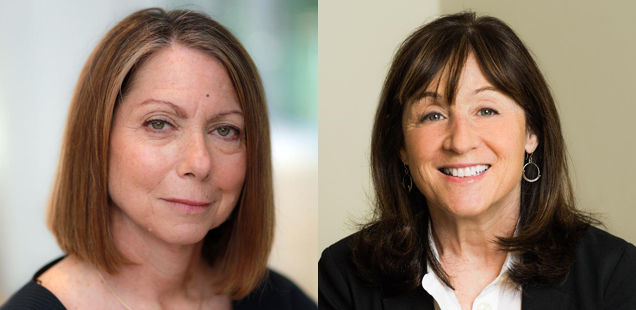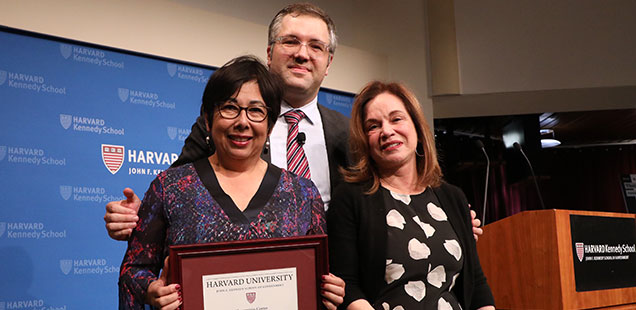It felt like every week of 2018 turned up another major news story that directly related to our work at the intersection of media, politics, and public policy. In the midst of it all, the team at the Shorenstein Center put out some incredible research on information disorder, platform accountability, business models for news, and the current state and future prospects for the free press in the United States.
It’s been a wild ride, and we’re taking just a few days off to gear up for doing even more in 2019. In the meantime, take a look back at some of the work we’re most proud of from the past year.
T.H. White Lecture
Jane Mayer of The New Yorker, and Jill Abramson, former Executive Editor of the New York Times, were the keynote speakers at this year’s T.H. White Lecture. They wrote an impassioned defense of the free press and the importance of empowering investigative journalism. Watch the video of their fascinating conversation with Shorenstein Center Director Nicco Mele.

Goldsmith Prize for Investigative Journalism
Renee Montagne of NPR and Nina Martin of ProPublica won the 2018 Goldsmith Prize for their reporting on the stunningly high rate of maternal mortality in the U.S. In December, Congress passed a law intended to reverse this dangerous trend – showing the real power of investigative journalism to make change and save lives.
The 2019 Goldsmith Award Ceremony will take place in March – stay tuned for ways to get involved!

Nina Martin and Renee Montagne accepting their 2018 Goldsmith Prize for Investigative Reporting from Shorenstein Center Director Nicco Mele.
Regulating Big Tech:
The Platform Accountability Project
The Fellows on our Platform Accountability Team have big ideas, built from long experience, about how to better regulate big technology companies for the greater good. This year they published recommendations about the old legal frameworks that should apply to tech companies today, and some practical considerations for regulating internet platforms.
Information Disorder:
Fighting Back Against Misinformation
While the Information Disorder Lab tracks and researches mis- and disinformation across the media landscape, fellows and faculty have been publishing papers advocating for a multidisciplinary approach to fighting misinformation, laying out a policy agenda to address the problem, and much more.
The Future of Journalism:
Business Models for News
Our Business Models team is working to figure out how to make local and investigative journalism financially sustainable in the new digital economy. Their field scan of business models for local news and research into the relationships between foundations and nonprofit media outlets are helping shine a light on how the news ecosystem can thrive, today and into the future.
Improving News Quality:
Bringing Academia and Journalism Together
Journalist’s Resource explained a wide range of academic studies for journalists, and offered better ways to cover hot topics and marginalized communities. Some of our favorites included research roundups on how health affects voter turnout and the impacts of school shootings on student achievement and enrollment. Also, two tip sheets for journalists covering rural America (with former Shorenstein Fellow and recent National Book Award Finalist Sarah Smarsh) and poverty (from our own Pulitzer Prize Finalist Denise-Marie Ordway, and Heather Bryant of Project Facet).
Don’t forget to subscribe to Journalist’s Resource to get more great articles and explainers in their weekly newsletter.
Representation in Journalism:
Diversity and Equity in the News
Farai Chideya, Program Officer at the Ford Foundation and Spring 2018 Joan Shorenstein Fellow, published “In the Shadow of Kerner: Fifty Years Later, Newsroom Diversity and Equity Stall,” which lays out how the failure to implement many of the recommendations of the 1968 Kerner Commission has lead to barely increased diversity in newsrooms in the United States over the past fifty years.
Elizabeth Arnold, another Spring 2018 Shorenstein Fellow, showed us what a lack of perspective and understanding of the communities affected by a news story does to the reporting on that story in “Doom and Gloom: The Role of the Media in Public Disengagement on Climate Change.”
Diversity in newsrooms, how the media reports on issues of race, class, and gender, and the impact of artificial intelligence and algorithms on structural bias are all big topics we’re digging into even more deeply in 2019. Stay tuned.
If you value the work that the Shorenstein Center is doing to support the free press and informed citizenry that a democracy requires, please make a gift to the Center today.


